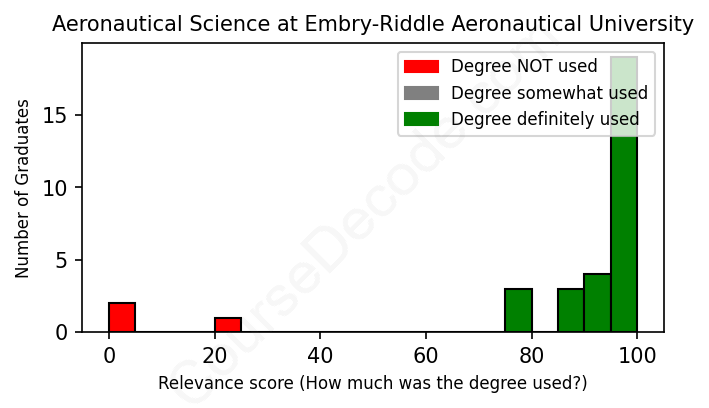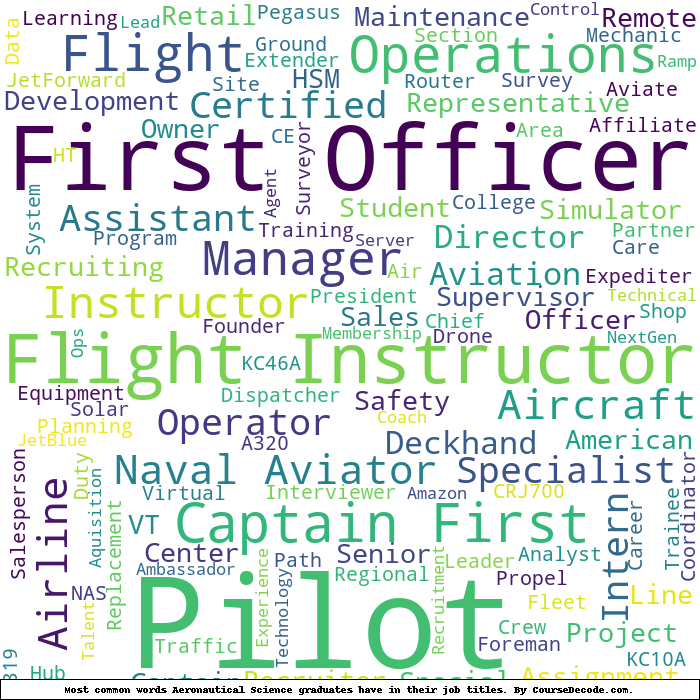
First, some facts. Of the Aeronautical Science graduates from Embry-Riddle Aeronautical University we've analyzed , here's how many have used (or NOT used) their degree in their career:

These are estimates based on AI analysis of 32 LinkedIn profiles (see below).
The verdict? Significantly above average. Overall, with an average relevance score of 86%, Aeronautical Science graduates from Embry-Riddle Aeronautical University have a much higher likelihood (+19%) of finding work in this field compared to the average graduate across all fields:
And for comparison, here's the chart for all profiles we've looked at across all degrees.
Also, after graduating, only 18% of these graduates have pursued further education other than another Bachelor's degree (such as a Masters degree or other), compared to the average across all profiles of 35%. This suggests a Bachelors degree is enough for most Aeronautical Science graduates, and it's normal to look for work straight after graduation.
See the details:
|
Relevance score: 100% We think this person has gone into a career highly relevant to their degree. We think this person has gone into a career highly relevant to their degree.
DEGREE INFOGraduated in 2021 from Embry-Riddle Aeronautical University with a Bachelor's degree in Aeronautical Science. Also pursued further education since (see below). JOB HISTORY SINCE GRADUATIONCertified Flight Instructor Flying Tigers Flight School Jun 2022 - Aug 2023 First Officer  Republic Airways Sep 2023 - Present FURTHER DEGREES DONE SINCE GRADUATINGMaster of Business Administration - MBAEmbry-Riddle Aeronautical University 2022 - 2025 ABOUTNo information provided. |
The top 10 most common jobs done by the graduates we've analyzed (ranked most common to least) are:
Based on the data from LinkedIn, people who graduated from Embry-Riddle Aeronautical University with a degree in Aeronautical Science tend to lean heavily towards aviation-related careers. A significant number of them have taken on roles like pilots, flight instructors, and various positions within the military, particularly with the Navy and Marine Corps as Naval Aviators. These jobs require a solid understanding of aeronautics, making them highly compatible with the education received at Embry-Riddle. Positions such as First Officers and Captains at various airlines also showcase how graduates are applying their flight operations knowledge in real-world settings, further emphasizing their degree's strong relevance to their careers.
However, not all roles linked to these graduates are directly related to aeronautical science. Some individuals transitioned into jobs such as operations management in hospitality or retail, which lack direct connections to aviation principles. While certain skills may be transferrable, the core knowledge from Aeronautical Science is often left untapped in those positions. Overall, the vast majority of careers pursued by these graduates are related to aeronautical science, showing a strong alignment between their studies and professional paths, but a few have ventured outside the field into less relevant industries.
Here is a visual representation of the most common words in job titles for Aeronautical Science graduates (this is across all Aeronautical Science graduates we've analyzed, not just those who went to Embry-Riddle Aeronautical University):

When looking at the career paths of graduates from the Aeronautical Science program at Embry-Riddle Aeronautical University, it's pretty clear that many have followed a strong trajectory in the aviation and aerospace fields. A lot of these graduates land their first jobs in flight instruction or as pilots immediately after school, often starting out as flight instructors or picking up roles related to flight operations. For instance, people graduating around 2010 to 2015 frequently begin their careers as flight instructors or flight operations interns and then progress to positions with major airlines or in military aviation as pilots or instructors. By the five- to ten-year mark, many graduates have moved up the ranks to become First Officers or Captains for reputable airlines like United, Delta, and American Airlines—a really solid indicator of successful career advancement.
However, not all graduates follow the aviation track seamlessly. Some have explored non-pilot roles in operations and data analysis, or even diverged completely into fields like retail or maintenance management, especially those who graduated after 2018. For more recent graduates, there appears to be a mix of roles, with some securing flight-related jobs quickly while others are exploring a variety of positions, including teaching and management outside direct aviation roles. Overall, it seems that while many Embry-Riddle graduates are thriving in aviation careers, the picture becomes more mixed as we look at recent graduates, with a notable portion venturing into less traditional paths. But if you're aiming to fly, this university provides a strong foundation and a network that lots of former students leverage for solid aviation careers!
Honestly, a Bachelor’s degree in Aeronautical Science at Embry-Riddle is pretty challenging, especially if you’re not already super into math and science. The coursework dives deep into complex subjects like aerodynamics, avionics, and flight mechanics, which can be a bit intense. The program is known for being rigorous because they really focus on giving you a solid foundation in both theory and practical skills. So, while it can definitely be rewarding for those passionate about aviation, be prepared to put in some serious effort—it's definitely not a walk in the park!
Most commonly, in the LinkedIn profiles we've looked at, it takes people 4 years to finish a Bachelor degree in Aeronautical Science.
Looking at the job histories of these Embry-Riddle Aeronautical University graduates, it seems like many of them are doing pretty well financially, especially those who went into aviation roles. Graduates who became pilots or worked with the military typically earn solid salaries, sometimes surpassing six figures, especially as they move up in rank or gain more experience. Even those who took on roles at airlines or in aviation management tend to make decent money. However, there are a few graduates who went into other fields or started at lower-paying positions, which might not be as lucrative right away. Overall, it seems like if they stuck with aviation, they likely made a good living, which is great considering the investment in their education!
Here is a visual representation of the most common words seen in the "about" section of LinkedIn profiles who have a Bachelor degree in Aeronautical Science (this is across all Aeronautical Science graduates we've analyzed, not just those who went to Embry-Riddle Aeronautical University). This may or may not be useful:

Here are all colleges offering a Bachelor degree in Aeronautical Science (ordered by the average relevance score of their Aeronautical Science graduates, best to worst) where we have analyzed at least 10 of their graduates:
| College | Score | Count |
|---|---|---|
 Embry-Riddle Aeronautical University Embry-Riddle Aeronautical University
|
86 | 32 |